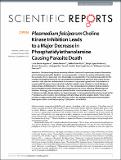Files in this item
Plasmodium falciparum choline kinase inhibition leads to a major decrease in phosphatidylethanolamine causing parasite death
Item metadata
| dc.contributor.author | Serrán-Aguilera, Lucía | |
| dc.contributor.author | Denton, Helen | |
| dc.contributor.author | Rubio-Ruiz, Belén | |
| dc.contributor.author | López-Gutiérrez, Borja | |
| dc.contributor.author | Entrena, Antonio | |
| dc.contributor.author | Izquierdo, Luis | |
| dc.contributor.author | Smith, Terry K | |
| dc.contributor.author | Conejo-García, Ana | |
| dc.contributor.author | Hurtado-Guerrero, Ramon | |
| dc.date.accessioned | 2016-09-13T12:30:09Z | |
| dc.date.available | 2016-09-13T12:30:09Z | |
| dc.date.issued | 2016-09-12 | |
| dc.identifier | 245295219 | |
| dc.identifier | 05df6e65-0bba-4ac3-915d-dab6cf5629cd | |
| dc.identifier | 000382915000001 | |
| dc.identifier | 000382915000001 | |
| dc.identifier | 84987621390 | |
| dc.identifier.citation | Serrán-Aguilera , L , Denton , H , Rubio-Ruiz , B , López-Gutiérrez , B , Entrena , A , Izquierdo , L , Smith , T K , Conejo-García , A & Hurtado-Guerrero , R 2016 , ' Plasmodium falciparum choline kinase inhibition leads to a major decrease in phosphatidylethanolamine causing parasite death ' , Scientific Reports , vol. 6 , 33189 . https://doi.org/10.1038/srep33189 | en |
| dc.identifier.issn | 2045-2322 | |
| dc.identifier.uri | https://hdl.handle.net/10023/9494 | |
| dc.description | This work was supported by Agencia Aragonesa para la Investigación y Desarrollo (ARAID), Ministerio de Economía y Competitividad (CTQ2013-44367-C2-2-P to R.H.-G.) and Diputación General de Aragón (DGA; B89 to R.H.-G.) and the EU Seventh Framework Programme (2007–2013) under BioStruct-X (grant agreement 283570 and BIOSTRUCTX 5186, to R.H.-G.). T.K.S. was supported by the Wellcome Trust grant 093228 and European Community’s Seventh Framework Programme under grant agreement No. 602773 (Project KINDRED). | en |
| dc.description.abstract | Malaria is a life-threatening disease caused by different species of the protozoan parasite Plasmodium, with P. falciparum being the deadliest. Increasing parasitic resistance to existing antimalarials makes the necessity of novel avenues to treat this disease an urgent priority. The enzymes responsible for the synthesis of phosphatidylcholine and phosphatidylethanolamine are attractive drug targets to treat malaria as their selective inhibition leads to an arrest of the parasite’s growth and cures malaria in a mouse model. We present here a detailed study that reveals a mode of action for two P. falciparum choline kinase inhibitors both in vitro and in vivo. The compounds present distinct binding modes to the choline/ethanolamine-binding site of P. falciparum choline kinase, reflecting different types of inhibition. Strikingly, these compounds primarily inhibit the ethanolamine kinase activity of the P. falciparum choline kinase, leading to a severe decrease in the phosphatidylethanolamine levels within P. falciparum, which explains the resulting growth phenotype and the parasites death. These studies provide an understanding of the mode of action, and act as a springboard for continued antimalarial development efforts selectively targeting P. falciparum choline kinase. | |
| dc.format.extent | 12 | |
| dc.format.extent | 1252750 | |
| dc.language.iso | eng | |
| dc.relation.ispartof | Scientific Reports | en |
| dc.subject | QH301 Biology | en |
| dc.subject | RA0421 Public health. Hygiene. Preventive Medicine | en |
| dc.subject | RS Pharmacy and materia medica | en |
| dc.subject | BDC | en |
| dc.subject | R2C | en |
| dc.subject | SDG 3 - Good Health and Well-being | en |
| dc.subject.lcc | QH301 | en |
| dc.subject.lcc | RA0421 | en |
| dc.subject.lcc | RS | en |
| dc.title | Plasmodium falciparum choline kinase inhibition leads to a major decrease in phosphatidylethanolamine causing parasite death | en |
| dc.type | Journal article | en |
| dc.contributor.sponsor | The Wellcome Trust | en |
| dc.contributor.sponsor | European Commission | en |
| dc.contributor.institution | University of St Andrews. School of Biology | en |
| dc.contributor.institution | University of St Andrews. Biomedical Sciences Research Complex | en |
| dc.identifier.doi | 10.1038/srep33189 | |
| dc.description.status | Peer reviewed | en |
| dc.identifier.grantnumber | 093228/Z/10/Z | en |
| dc.identifier.grantnumber | en |
This item appears in the following Collection(s)
Items in the St Andrews Research Repository are protected by copyright, with all rights reserved, unless otherwise indicated.

